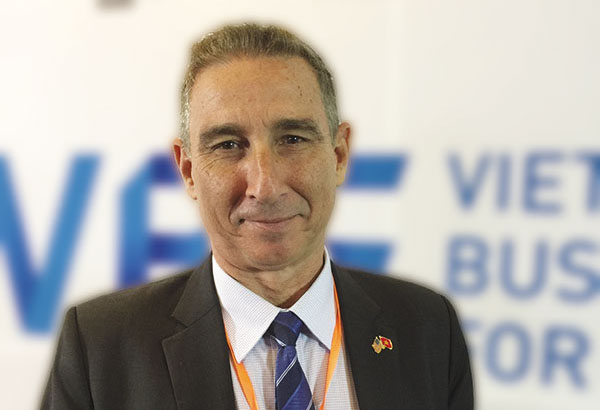Collaboration is the key to a renewable energy future
 |
John Rockhold, chairman of the Vietnam Business Forum’s Power and Energy Working Group, talked with VIR’s Phuong Thu about how to maximise Vietnam’s energy resources to stimulate investment in energy generation and attract foreign investors.
What is the linkage between foreign investors and local investors in Vietnam’s energy sector?
We cannot develop the energy sector without domestic companies. We need strong domestic developers. We need equipment for renewable energy projects made here in Vietnam, as the country has to import these items currently.
The cost is too high to implement renewable energy projects [on our own]. We need local companies involved in [the field] to kick start its growth. The local companies can structure renewable energy projects so we can drive their price down. For example, we have seen how other countries have invested in solar power projects. When they first invested in solar, at first the price was 13, 14, 15 UScents per kWh. In the few years after domestic firms were able to come in with the technology and learn it, the price dropped down to 6 UScents. This is what we want to do.
We also want to see that we can buy energy directly from a power producer. Right now we can only buy power from state-run Electricity of Vietnam (EVN). Buying energy directly has been shown to be extremely effective in developing clean energy in other countries. Foreign investors in Vietnam, and other multinational corporations as Intel and Nike, have publicly made global commitments to work towards using energy from renewable, energy-efficient projects. A change in this policy, allowing enterprises and customers to have access to clean energy, will attract additional investment and global brands that will help carry Vietnam up the manufacturing value chain. If the Vietnamese government approves direct power purchase agreements of 1,000 megawatts of wind power and solar power that can be added to the grid before 2020, this will cost the government nothing in capital costs, and will not require any government guarantee.
Besides power purchase agreements between power producers and larger power consumers in wind or solar farms, what are the recommendations of your “made-in-Vietnam energy plan” in your report at VBF?
The report outlines the advantages of placing greater emphasis on cleaner domestic energy solutions for Vietnam’s future energy needs, and demonstrates the advantages of domestic hydro, gas, wind, and solar energy. It also directly supports Vietnam’s global and domestic environmental commitments and will attract immediate investment from the private sector.
We need to create a clear power pricing roadmap to 2020, with a vision to 2025, including a definition of variable pricing between the three main tariff groups: residential, commercial, and industrial. The provision of actual cost information can empower consumers and investors as to the most effective way to invest in higher efficiency equipment and processes. Energy efficiency investment and innovation is not occurring in high volume now because consumers believe the power price will remain low. Meanwhile, investors require government guarantees because the prices do not reflect the full costs of production.
In addition, we suggest the government works with the private sector to develop offshore gas reserves and infrastructure, and encourage exploration to bring additional gas on line as soon as possible to reduce the need for imported coal.
We support the enhancement of EVN’s creditworthiness. This involves increasing international donor support for renewable and cleaner energy development, and procedures to assist the costs of guaranteeing that EVN will pay power suppliers, under a power purchase agreement for renewable and clean energy projects in Vietnam.
Your report also referred to related environmental issues, which are one of the big concerns of the public. In your opinion, what kind of punishments should be instituted for polluters?
Many countries have a “pollution pays” law – if you make pollution, you pay for it. In Vietnam, polluters are only fined, and if you look at the fine, it is very low. People will pay much more attention to pollution if they are hit with very high fines.
Vietnam has in place adequate environmental laws and regulations, but sadly we have seen businesses able to bypass these laws.
The government of Vietnam needs to consistently and comprehensively enforce these laws, forcing companies to implement their environmental plans, especially those with large energy consumption and potential pollution risks from producing things like cement, steel, and fertilizer.
What the stars mean:
★ Poor ★ ★ Promising ★★★ Good ★★★★ Very good ★★★★★ Exceptional
Latest News
More News
- Hermes joins Long Thanh cargo terminal development (February 04, 2026 | 15:59)
- SCG enhances production and distribution in Vietnam (February 04, 2026 | 08:00)
- UNIVACCO strengthens Asia expansion with Vietnam facility (February 03, 2026 | 08:00)
- Cai Mep Ha Port project wins approval with $1.95bn investment (February 02, 2026 | 16:17)
- Repositioning Vietnam in Asia’s manufacturing race (February 02, 2026 | 16:00)
- Manufacturing growth remains solid in early 2026 (February 02, 2026 | 15:28)
- Navigating venture capital trends across the continent (February 02, 2026 | 14:00)
- Motivations to achieve high growth (February 02, 2026 | 11:00)
- Capacity and regulations among British areas of expertise in IFCs (February 02, 2026 | 09:09)
- Transition underway in German investment across Vietnam (February 02, 2026 | 08:00)
















 Mobile Version
Mobile Version